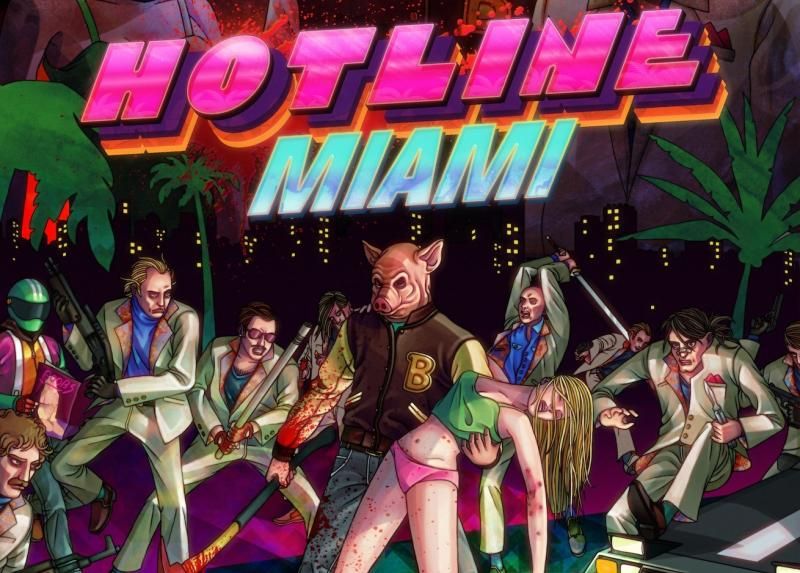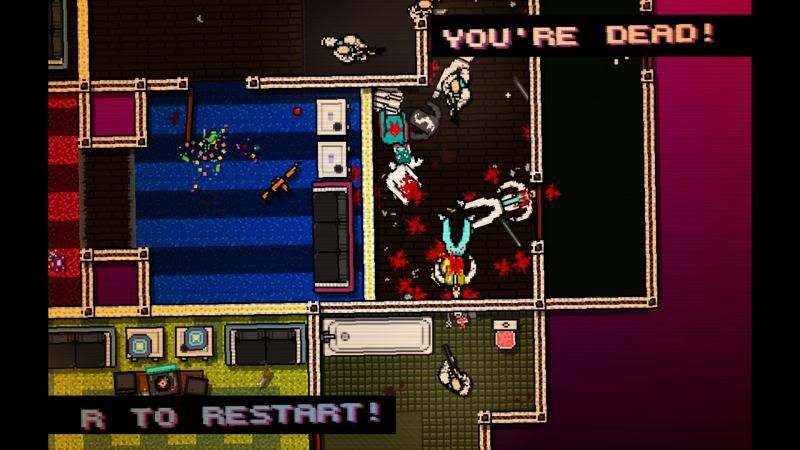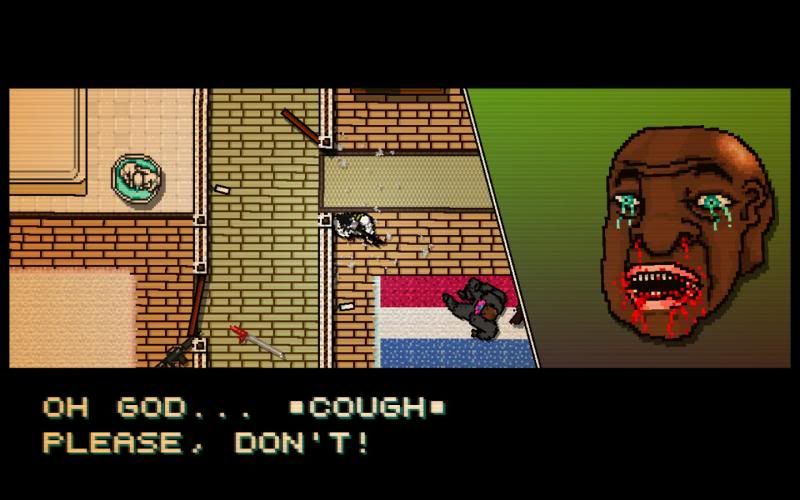Some of the big names in game development have been around for decades. It can be intimidating to look at a field long occupied by well-known names, and even consider the possibility of entering it. But it’s important to have fresh voices and new blood join the fold. Unique perspectives and provocative ideas are the lifeblood of any industry, game design in particular, and nobody can accuse Devolver Digital and Dennaton Interactive of not being unique and provocative. Of course, taking a glance at Hotline Miami, others may describe the designers as “batshit.”

The plot of the game is, on the surface, rather thread-bare. The protagonist is not given a name within the context of the game; he seems to be just some random dude in Miami during the heady, gratuitous days of the 80s. He gets calls on his answering machine, telling him places to be. He drives there in his DeLorean, and when he gets there, he starts bashing brains in. We’re not sure who his targets are, why he’s being sent there, or why he even started doing this. All we know is that we have a top-down floor plan of the target building, a bunch of folks with weapons intent on killing us, and the primary goal of killing them first.
I’ve discussed Hotline Miami previously, focusing on its gameplay, so I’m going to hit other things that make this game so interesting to experience. The aesthetic is both infused with the neon and garish juxtaposition of color that is thoroughly 80s, and flickering and pulsing in a way that can only be described as psychedelic. While we see buildings and cars, we see no roads or sidewalks that connect them. The houses and offices in which we commit our brutal acts of mass murder are disconnected from the rest of the world, isolated and afloat in the flickering sea of colors, which makes the entire experience at once unrealistic and searingly unforgettable.

You’ll see this message quite a bit. Get used to it.
As you play the game, you’ll unlock masks and weapons that increase your options for dispatching your fellow man (and the occasional canine). Here, again, the aesthetic and presentation of the game lead to a disconnect between the reality of the situations and our perception of them. While the focus of the gameplay is on the puzzle-like nature of the layouts, patrol patterns, and speed required to successfully avoid getting killed and clear the level at the same time, here again is an example where the art informs the story. Much like ourselves, “Jacket” (the main character) is disconnected from what he’s doing on a fundamental level. The presentation of the game’s core content not only encapsulates the violence as a challenge to be overcome, but also provides another layer at which we are witnessing the slow decent of a human being’s sanity into the dark depths of madness.
Before I elaborate more on this point, the game’s excellent soundtrack deserves a mention. Rather than going for popular tunes of the time, the developers tapped some very talented independent artists to lend their music to the experience. Sun Araw, M|O|O|N, Jasper Byrne, Scattle, and Perturbator are among the minstrels who pour their talent into make the experience of Hotline Miami incredibly unique. Subtle, low-key trance music playing while you bash someone’s skull against a kitchen floor is another level of cognitive dissonance that makes the experience of playing the game both surreal and unforgettable.

Does Jacket even understand what the concept of mercy is at this point?
As the game proceeds, events begin to change even as you witness them. People change before your eyes. Events become more and more disconnected. The pace of Hotline Miami coupled with its unique presentation and subtle use of the medium to convey a narrative on several levels makes it a work of mad brilliance. The longer you spend playing it, the deeper you get into its systems, the more it reveals to you in terms of unlocks, ways to approach the challenges, and a deeply satisfying play experience. I can’t think of a triple-A studio that would take the chances Hotline Miami takes, and it’s one of the many reasons supporting independent game development is in the best interest of anyone interested in this hobby and its growth.



Leave a Reply